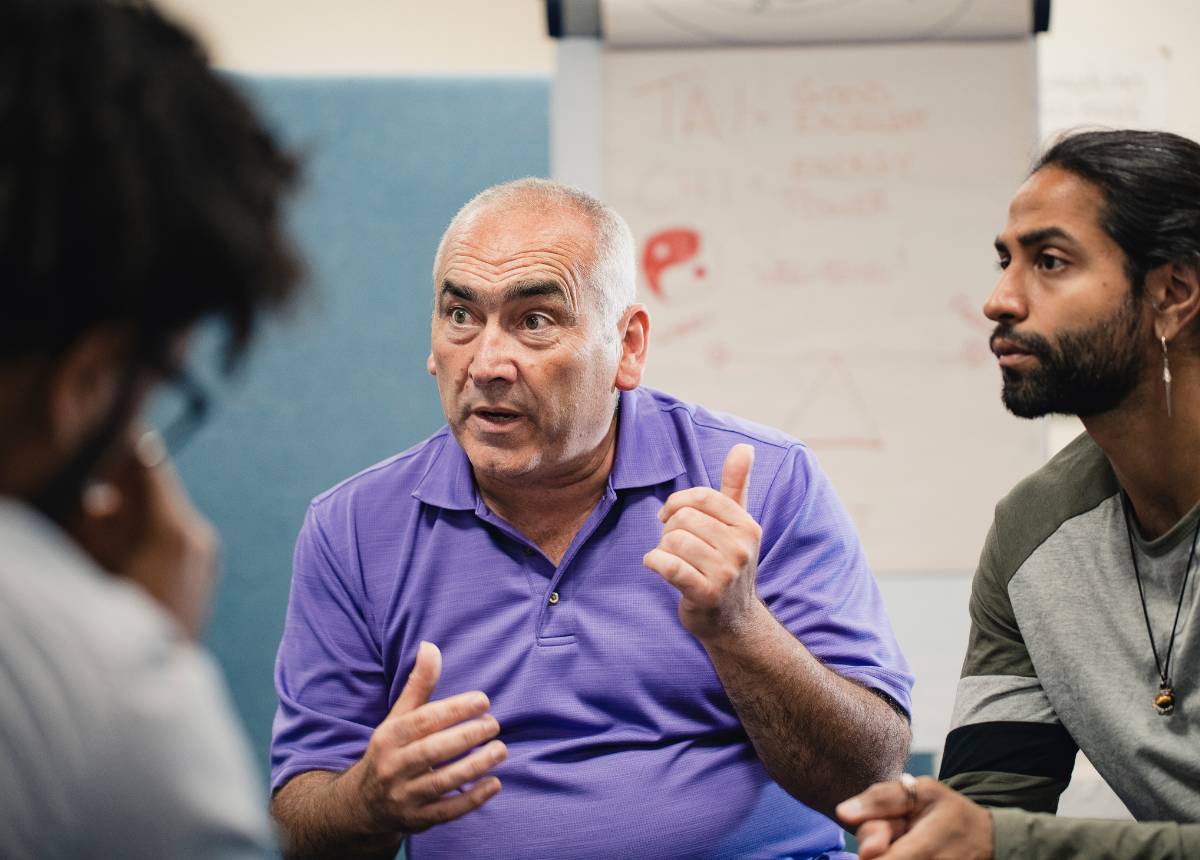Our team of Support Workers provide emotional and practical support to lesbian, gay, bisexual, trans, queer, and intersex people, who are going through the UK asylum and immigration system. We spoke to one of them, Stuart, who explained what Support Workers do, and why their work is so important.
What kind of issues are LGBTQI+ people in the asylum system specifically facing?
LGBTQI+ people seeking asylum face particular risks. One of the biggest issues is living conditions. LGBTQI+ people are often housed in inappropriate accommodation, with people who are LGBTQI-phobic.
LGBTQI+ people also must ‘prove’ their sexual orientation and gender identity for their asylum application, but this can be very challenging. LGBTQI+ people are sometimes disbelieved by the Home Office, which often wants straightforward, traditional stories of “coming out”, but most of our service users have had to live secret lives as they are fleeing dangerous and homophobic societies. Or the Home Office might expect our service users to provide very specific evidence, such as being in a relationship. They are often isolated which means they aren’t part of an organisation and don’t have LGBTQI+ friends.
Often, they are fleeing persecution in their home country, and come to the UK seeking safety. As they have often had to hide their sexual orientation and gender identity, it can be very difficult for them to provide any evidence they are LGBTQI+. They might also need to avoid other people from their country, because they might be at risk of facing the LGBTQI-phobic abuse they are fleeing.
This means that LGBTQI+ people in the asylum system in the UK need specific support and safeguarding throughout the asylum process, which we aim to provide for them.

What does a Support Worker at Rainbow Migration do?
Primarily, we provide one-on-one emotional support. We also have men’s, women’s and trans support groups. We meet, in person, twice a month. This is an opportunity for our service users to meet other people in similar situations, and to share our good or bad news with each other. It’s a way of building a support network, and it’s a really important part of our service.
Generally, our service users are very isolated. The pandemic made that worse. We are here to talk to them. They are often new to the UK and don’t know many people. Often, they keep their sexual orientation, gender identity, and their asylum status to themselves. Many are used to having to hide who they are, having faced a lot of stigma both in their home countries and here in the UK. They are often traumatised and may find it difficult to talk to strangers in a Home Office interview. We help them deal with what can be very stressful situations.
We help our service users access safe housing and healthcare. We talk to them about mental health, and if we need to, find them a therapist or counsellor, or make sure they have access to the right medication. Sometimes we cover their costs for healthcare, or essential purchases such as hygiene products or food.
We also have a legal team to guide them through the asylum process, and they help them find legal representation. We refer our service users to legal aid solicitors, or for pro-bono advice. We also have monthly partnership sessions, where pro-bono solicitors offer free advice to LGBTQI+ couples who need support when one or both partners need a visa to stay in the UK, as the process for couples is different.
All our services are free, confidential, and available before and during their asylum claim.
What does a typical day for a Support Worker look like?
I book calls and have catchups with service users. Most of my service users don’t have many people to talk to, so it’s important I can be there for them. Sometimes I have emergencies, such as someone being made homeless, or someone urgently needing a solicitor. Many of my service users feel very low and are having mental health crises; so, I take lots of time each day to be as much of a support to them as possible. This can be in person, over the phone, or by email. Many feel unheard, invisible, ignored, helpless. I am here to listen and help as much as I can.
Every two weeks I run the men’s support group. We meet in person, and at the moment we have about 15 men in the group. It is a safe space, for our service users to share their stories, listen to each other, and be themselves without judgement.
What is the asylum process like?
It can take years to claim asylum. Some of our service users wait as long as five years to hear a decision. Many wait two years just for the interview. They just don’t know when they’ll hear. There’s no pattern, it’s not like the Home Office is working through an organised waiting list. It’s impossible to say when people will hear about their case. Their lives are on hold. It’s a very long, frustrating waiting game.
Whilst they’re waiting, they’re trying to live on £40 a week. It’s almost impossible. After a year you can apply to work but only for specific jobs such as care, but many of our service users are not in a situation to provide care for others. Many of them are facing their own mental health issues. Most of them need too much support to then be supporters and carers themselves.

How could the system be improved?
People seeking asylum should be able to work, have access to better housing, and have a choice about where to live. There should be more LGBTQI+ accommodation, such as the ones that Micro Rainbow already provides. Trans people seeking asylum are especially at risk. LGBTQI+ people should be able to live and work safely. The process is so expensive, yet also so slow. The application system needs a time limit; people should be guaranteed an interview and a decision by a certain time. It’s so cruel to keep people waiting, in poverty, for years. The fact that the system is getting even slower since the pandemic is ridiculous.
LGBTQI+ people in immigration detention are not safe. They shouldn’t detain anyone; the use of indefinite immigration detention is inhumane. At the moment, people can be detained in these centres for months and even years. Their lives are in total limbo.
The system is terrible for everyone, but it especially harms LGBTQI+ people. Those seeking asylum should be able to work. Instead they are housed in Home Office accommodation, with nothing to do; the current system costs a huge amount, and no-one in this country benefits, financially, or otherwise.
We need a massive change in the way the media reports asylum; we need to change public opinion around it. We need a change in the asylum system. The whole process is broken.
What is the best thing about your job?
Well, my job shouldn’t exist. If we had a better, more humane system, my role wouldn’t be necessary! But as it is, I do the best I can. What I will say is that I have the most amazing team and support network around me. My colleagues are fantastic, and I couldn’t do this job without them.
